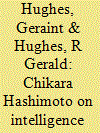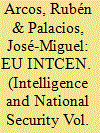| Srl | Item |
| 1 |
ID:
173966


|
|
|
|
|
| Summary/Abstract |
‘We cannot allow [Nasser], who has neither the authority of a throne nor of a parliament to destroy our base and threaten our rear’ Harold Macmillan, diary entry for 23 September 1955
|
|
|
|
|
|
|
|
|
|
|
|
|
|
|
|
| 2 |
ID:
173961


|
|
|
|
|
| Summary/Abstract |
Recent events have brought a renewed attention to the system of security vetting which exists in the United Kingdom. This paper outlines the operation of that system against the legal background, demonstrating some of the difficulties with the system as it now exists and which would need to be considered in the event that the system was reformed.
|
|
|
|
|
|
|
|
|
|
|
|
|
|
|
|
| 3 |
ID:
173962


|
|
|
|
|
| Summary/Abstract |
This article aims to gain a better understanding of EU INTCEN’s analytic culture and the use of structured analytic techniques by EU analysts; an under researched topic in the intelligence studies literature. The Intelligence Analysis and Situation Centre of the European Union (EU INTCEN) is a directorate of the European Union External Action Service (EEAS) that has been characterized as an EU analytic structure similar to the State Department’s INR. The article reviews relevant literature and presents findings based on the analysis of a questionnaire on ‘Intelligence analysis and production in EU INTCEN/SITCEN, that was distributed to EU INTCEN intelligence analysts (EEAS officials having worked as analysts in EU SITCEN/INTCEN between June 2005 and June 2014), and in-depth phone interviews to better understand INTCEN analytical process. Analytic projects at EU INTCEN are initiated with Requests for Information to which replies can be received. The analysts count as well with previous contributions and assessments, open sources, and diplomatic reporting. Among other findings, the study reveals that SATs are little used in practice in spite of most EU INTCEN analyst has received some training on SATs.
|
|
|
|
|
|
|
|
|
|
|
|
|
|
|
|
| 4 |
ID:
173958


|
|
|
|
|
| Summary/Abstract |
On 5 August 2016, former Deputy Director of the Central Intelligence Agency (CIA) Michael Morell, in an op-ed in the New York Times, endorsed Hillary Clinton for president of the United States over Donald J. Trump, citing his career as an intelligence officer as authority for his action:
|
|
|
|
|
|
|
|
|
|
|
|
|
|
|
|
| 5 |
ID:
173964


|
|
|
|
|
| Summary/Abstract |
The activities of intelligence services and the expansion of their powers have moved to the center of public debates since the terrorist attacks in Europe. Major discussions have been focused on the mechanisms of mass surveillance, which entail the infringement of individual rights. The purpose of this article is to compare how surveillance powers of intelligence services in the Czech Republic and Slovakia developed in the context of fight against terrorism. Intelligence services in both countries tried to expand their surveillance powers and these attempts have been met with criticism from the political opposition, civil society and courts.
|
|
|
|
|
|
|
|
|
|
|
|
|
|
|
|
| 6 |
ID:
173965


|
|
|
|
|
| Summary/Abstract |
Many western historians believe that in November 1983 the world went to the brink of nuclear war. Paranoid Soviet leaders, it is argued, feared that an annual NATO exercise to rehearse nuclear release procedures, Able Archer 83, was being used to disguise preparations for an American nuclear first-strike. As a consequence, Soviet nuclear forces prepared to launch a pre-emptive nuclear attack that would have precipitated Armageddon. In their very different books, Nate Jones and Taylor Downing explore the contexts and risks of what Robert Gates has called, ‘one of the potentially most dangerous episodes of the Cold War’.
|
|
|
|
|
|
|
|
|
|
|
|
|
|
|
|
| 7 |
ID:
173959


|
|
|
|
|
| Summary/Abstract |
In 1949, Canadian and US officials crafted a signals intelligence sharing agreement called CANUSA. The history of CANUSA, and especially the Canadian record of its context and negotiation, has been covered by official secrecy until now. This article draws on newly released material from an official history account written by the author two decades ago. CANUSA was both a guarantor of the survival and independence of a postwar Canadian signals intelligence effort, and the beginning of an expansion of signals intelligence sharing in peacetime that would ultimately shape the modern ‘Five Eyes’ alliance.
|
|
|
|
|
|
|
|
|
|
|
|
|
|
|
|
| 8 |
ID:
173960


|
|
|
|
|
| Summary/Abstract |
With unique access to police and government resources in almost all levels of society, the Burma Police Special Branch was a core part of the colonial intelligence apparatus. It was the primary political intelligence organisation active in this period and acted as an analytical and advisory body to government. However, over time the Special Branch lost its investigative capability and when faced with increased political unrest in the 1920s and 1930s, it struggled to adapt to the changing conditions, resulting in intelligence failures and the creation of new, competing political intelligence units.
|
|
|
|
|
|
|
|
|
|
|
|
|
|
|
|
| 9 |
ID:
173963


|
|
|
|
|
| Summary/Abstract |
The Russian Internet Research Agency (IRA) prosecuted an online campaign to undermine the 2016 US presidential election. It sought to accentuate existing social conflicts to affect the electoral behaviour of select groups. However, the IRA’s actual effect on the election outcomes, as assessed through its effect on its specifically targeted regions, was minimal. Nonetheless, the Kremlin successfully exploited the shock of Trump’s victory to exaggerate the apparent effect of Russian intervention. By seemingly fecklessly denying an apparently successful covert action, Moscow further challenged the legitimacy of the US election and degraded the coherence of US strategic decision making.
|
|
|
|
|
|
|
|
|
|
|
|
|
|
|
|